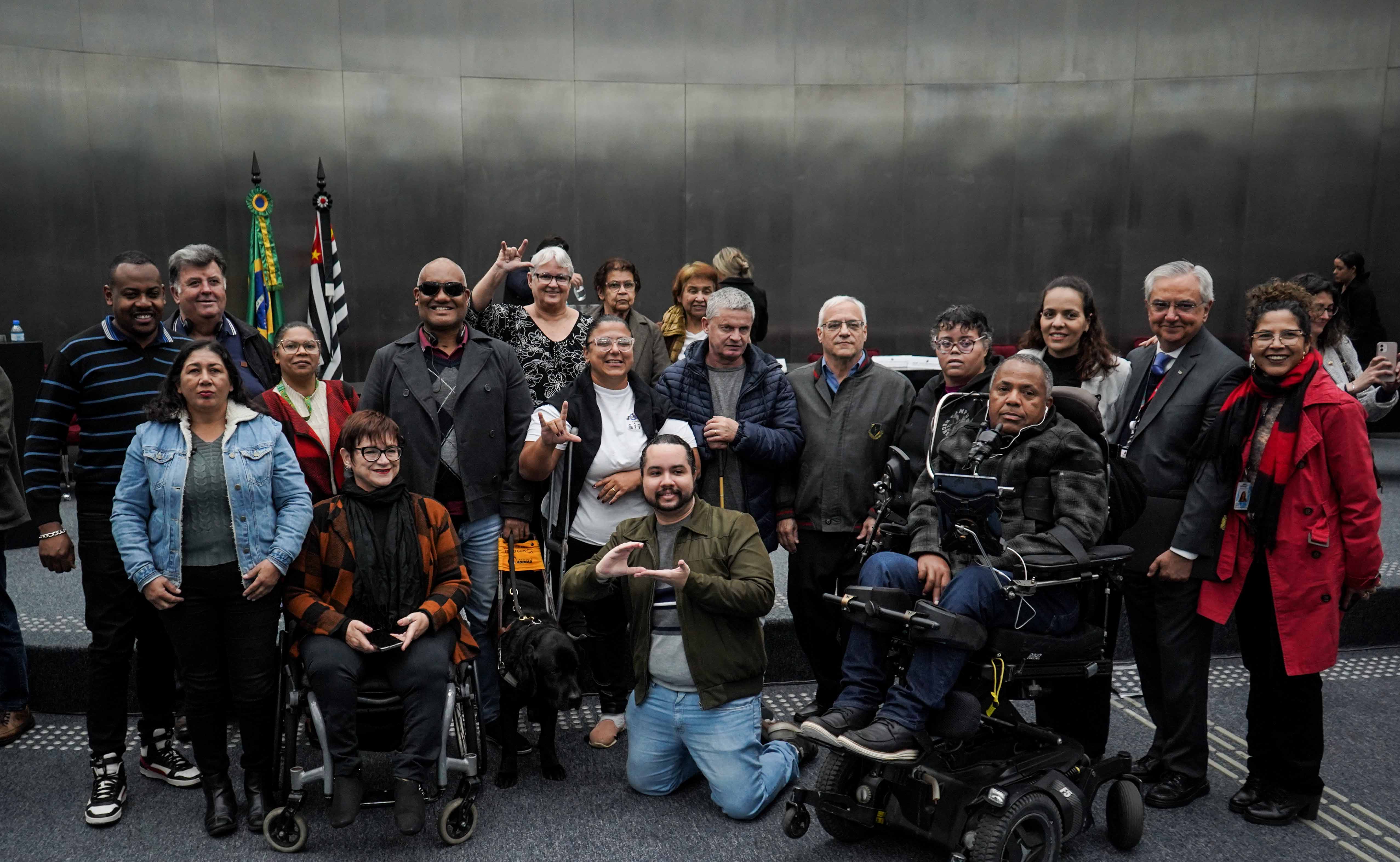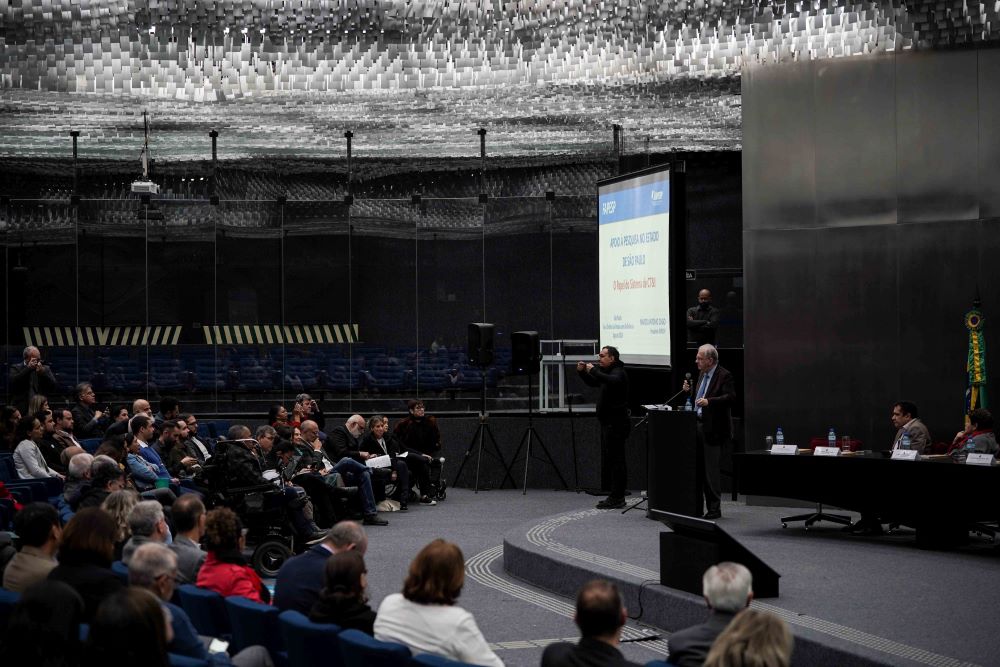Inclusiveness
FAPESP launches four Science for Development Centres focusing on inclusion
Partnerships between government departments, universities and research centres aim to meet community requirements, such as developing devices, applications and processes that enhance assistance, rehabilitation and improve the quality of life of people with disabilities.
Inclusiveness
FAPESP launches four Science for Development Centres focusing on inclusion
Partnerships between government departments, universities and research centres aim to meet community requirements, such as developing devices, applications and processes that enhance assistance, rehabilitation and improve the quality of life of people with disabilities.

The inauguration ceremony was held today, Wednesday, at the Inclusion Museum (Photo: Daniel Antonio/FAPESP Agency)
Maria Fernanda Ziegler | FAPESP Agency – The Center for Assistive Technologies for Activities of Daily Living (Tecvida), based at the Polytechnic University of São Paulo (Poli-USP), intends to develop exoskeletons and motorized wheelchairs that are lighter, more resistant and economically accessible. To achieve this, the organization relies on a partnership with the State Secretariat for the Rights of Persons with Disabilities and researchers from the Universities of the State of Campinas (Unicamp), the State of Paulista (Unesp), the Federal University of ABC (UFABC) and the Institute of Advanced Technological Research (IPT).
At Unicamp, the Libras Assistive Technology and Accessibility Center (Taal) will aim to create an automatic translation app from Portuguese to Libras and from Libras to Portuguese, through machine learning.
The Multidisciplinary Center for the Development of Assistive Technology (CMDTA), based at Unesp University of Bauru, aims to create a network of laboratories to develop prosthetics, orthoses and new technologies for Braille. Finally, the Assistive Technology Center for Bilingual Education for the Deaf (Taebs), a partnership between Unicamp and the Municipal Education Department of Campinas, will develop educational materials targeting deaf students.
These four new Scientific Centers for Development (CCD), approved in the third notice, were launched by FAPESP on Wednesday (14/08), in a ceremony held at the Museum of Inclusion in the capital São Paulo. The projects are a partnership between the Foundation – which invests a total of R$ 29 million – with the State Secretariat for the Rights of Persons with Disabilities, the Secretariat of Education of Campinas, public universities of São Paulo and research institutes.
“Today is a day of celebration and celebration is important because it creates an example and brings new implications and initiatives. The proof of this is that we are celebrating the launch of four new conventions to combat desertification and that the secretaries present here announce their intention to create more. In São Paulo, we have the CT&I system [ciência, tecnologia e inovação] Very mature, it is present not only in academia, but also in more than 10,000 private companies investing in R&D and innovation. Therefore, at FAPESP, our goal is to collaborate to promote inclusion and improve people’s lives. Marco Antonio ZagoPresident of FAPESP.

Zago highlighted the strength of São Paulo’s science, technology and innovation system.Photo: Daniel Antonio/FAPESP Agency)
The Secretary for the Rights of Persons with Disabilities, Marcos da Costa, also celebrated the launch of the new CDT. “As soon as the notice was issued, we went to FAPESP to talk to Professor Zago and we started dreaming,” said Costa, who is part of the project. “Our researchers can change the world and these projects inaugurated today will allow greater access to assistive technologies.” Three of the four new centres (Tecvida, Taal and CMDTA) are being created.
All 49 CCDs approved in three notifications are developing research projects aimed at solving problems highlighted by public authorities and society.
“There is a lot of talk about bringing academia closer to society, but there is a small detail: government must also be close to academia and society. That is why the FAPESP initiative to support the interaction between academic research and government is worthy of praise. The formula for scientific development centers is simple: public authorities raise problems, FAPESP issues a notice and research centers step forward to solve these problems for the benefit of developing public policies.” Vahan AgopianMinister of State for Science, Technology and Innovation.
Co-financing model
Together, the calls for proposals launched in 2020, 2021 and 2023 have generated an investment of R$324 million from FAPESP.
All projects operate under a co-financing model: for every Brazilian Real requested by the Foundation, a similar counterpart is contributed by partner entities. The funding is long-term, up to five years, and the projects submitted must have clear governance and review mechanisms throughout the implementation period and intermediate objectives. The results should promote advances in knowledge and improve public policies.
FAPESP’s objective in launching the three notices was to identify, measure and detail the main public challenges in the State of São Paulo and, based on them, to bring together and organize the different institutional actors in search of appropriate solutions to solve or reduce these bottlenecks.
The CCDs program then receives proposals from consortia formed by researchers associated with universities and research institutions in São Paulo, managers from state and municipal government agencies, as well as companies and NGOs.
“With the pandemic, we have seen a decline in the number of projects submitted. Scientific production and the organization of resource requests have declined. In 2022, we will grow again. These resources that have been kept in a safe place are being used to create Science for Development Centers, a way to unite efforts between academia, government and companies in projects aimed at solving problems posed by society.”
Also on Wednesday, a joint notice was signed between USP, Unicamp and Unesp for R$10 million, to support the development of assistive technologies.
“The public universities of São Paulo are ready to face any challenge that society presents. Therefore, we allocate funds from the universities to support the cause of inclusion. We expect that, with this notice, our researchers will work together and collaborate towards solving problems in our society and in formulating public policies, after all, the goal of the university is to generate knowledge and transmit it to society as quickly as possible.” Carlos Gilberto Carlote JuniorDean of the University of the South Pacific.
Also participating in the event, which was held at the Museum of Inclusion, were: Vinicius Neiva, Executive Secretary for Education; Anna Maria Frattini FelettiRector of Research at Unicamp; Pasquale BarettiDean of Unesp. Maria de Jesus Dutra dos ReisVice-Chancellor of UFSCar University; Claudia Regina VieiraVice President for Community Affairs and Positive Policies at UFABC; Anderson Ribeiro CorreaCEO of IPT; Ignacio Maria PovedaSpecial Advisor to the Minister for the Rights of Persons with Disabilities; Arturo Forner CorderoPrincipal Investigator at Tecvida; Jose Mario Di MartinoSenior Researcher at Tal; Carlos Roberto GrandiniPrincipal Investigator at CMDTA; and Ivany Rodriguez Silvaa senior researcher at Taebs.



![[VÍDEO] Elton John’s final show in the UK has the crowd moving](https://www.lodivalleynews.com/wp-content/uploads/2023/06/Elton-John-1-690x600.jpg)

More Stories
The Director of Ibict receives the Coordinator of CESU-PI – Brazilian Institute for Information in Science and Technology
A doctor who spreads fake news about breast cancer is registered with the CRM of Minas
The program offers scholarships to women in the field of science and technology